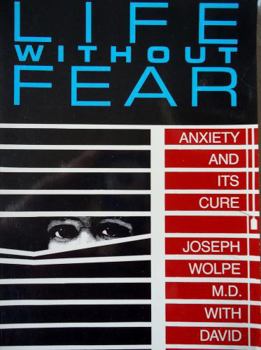Life Without Fear
Select Format
Select Condition 
Book Overview
Explains the difference between useful and useless fears and presents an account of behavioral treatments and their scientific bases. This description may be from another edition of this product.
Format:Paperback
Language:English
ISBN:0934986495
ISBN13:9780934986496
Release Date:January 1988
Publisher:New Harbinger Publications
Length:131 Pages
Weight:0.68 lbs.
Dimensions:0.5" x 6.0" x 9.0"
Customer Reviews
1 rating
Fear Unmasked
Published by Thriftbooks.com User , 15 years ago
I have been interested in psychology for over 20 years. I earned a bachelor's degree in psychology back in 1991. One of my goals is to assemble a body of relatively easy-to-read, nontechnical literature that represents the writings of every great psychologist. Joseph Wolpe, a behaviorist from South Africa, is far less well known by the average person than say William James, Freud, Rogers or Skinner, but his ideas are quite important in regard to the the area of "phobias". In this book (written in conjuction with his son David), Wolpe presents ideas on systematic desensitization, flooding and relaxation techniques in layman's terms. You might think that the phobia is a rare thing dealing only with the irrational fear of spiders, elevators, the number 13 and such. But Wolpe also makes the case that fear is actually at the root of anxiety and effects far more people than one might think. According to Wolpe, a great many people's personality issues (especially relationship and marital issues) are based in fear of commitment, or fear of rejection, or fear of being on one's own in life, or fear around sexual issues. Franklin D. Roosevelt once said that the "only thing we have to fear is fear itself", and Joseph Wolpe also creates an interesting discussion of "fear itself". In fact, Wolpe belies the famous words spoken by FDR, in that he explains fear as a quite natural and necessary emotion. Sometimes it is a matter of situation, as it was told to the Cowardly Lion by the Wizard of Oz: "You are under the delusion that simply because you run away from danger, you have no courage. You are confusing courage with wisdom." Wolpe, therefore, notes that not all fear is a bad thing. However, there are certain varieties of fear that can almost paralyze a person into head-aches, insomnia, irritable bowels, and a whole lot more miserable physical and mental manifestions of such. Wolpe also generates an interesting critique of Sigmund Freud, and presents Behavioral therapy very much so in that light. While Wolpe respectfully gives credit to Freud's brilliance as an imaginative and groundbraking psychological insights; Wolpe also discusses the limits of Freud's therapy and other therapies based upon Freud or theories that have grown out of Freud's ideas (neo-Freudian and Psychoanalytically oriented therapy). As a former Freudian turned to behaviorism, Wolpe does this in an even-handed way and even goes on to discuss the limitations of Behavioral therapy as well. I would include this book as a useful addition to a psychology library. While Freud might see sex as the root of anxiety, and Nietzsche may see the will for power as what moves people, and Carl Rogers may see personality problems as rooted in a lack of self-esteem; Joseph Wolpe makes a good case for fear as, at least, a strong element of stress and anxiety in our daily lives.





